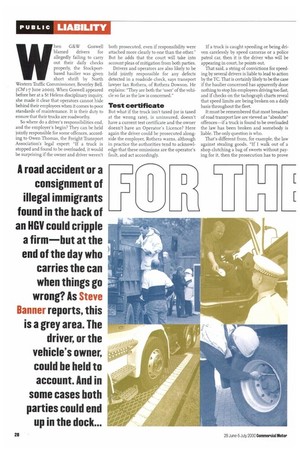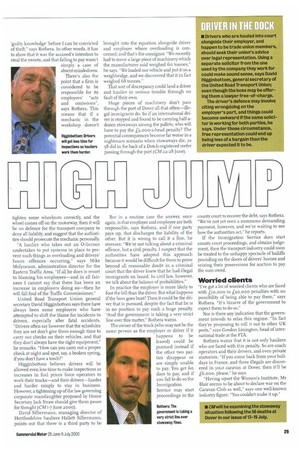Vil hen G&W Coswell blamed drivers for allegedly failing to
Page 30

Page 31

If you've noticed an error in this article please click here to report it so we can fix it.
carry out their daily checks properly, the Stockportbased haulier was given short shrift by North Western Traffic Commissioner, Beverley Bell. (CM .1.7 June zipcict). When Goswell appeared before her at a St Helens disciplinary inquiry, she made it clear that operators cannot hide behind their employees when it comes to poor standards of maintenance. It is their duty to ensure that their trucks are roadworthy.
So where do a driver's responsibilities end, and the employer's begin? They can be held jointly responsible for some offences, according to Owen Thomas, the Freight Transport Association's legal expert: "If a truck is stopped and found to be overloaded, it would be surprising if the owner and driver weren't both prosecuted, even if responsibility were attached more clearly to one than the other" But he adds that the court will take into account pleas of mitigation from both parties.
Drivers and operators are also likely to be held jointly responsible for any defects detected in a roadside check, says transport lawyer Ian Rothera, of Rothera Dowson. He explains: They are both the 'user' of the vehicle so far as the law is concerned."
Test certificate
But what if the truck isn't taxed (or is taxed at the wrong rate), is uninsured, doesn't have a current test certificate and the owner doesn't have an Operator's Licence? Here again the driver could be prosecuted alongside the employer, Rothera warns, although in practice the authorities tend to acknowledge that these omissions are the operator's fault, and act accordingly. If a truck is caught speeding or being driven carelessly by speed cameras or a police patrol car, then it is the driver who will be appearing in court, he points out.
That said, a string of convictions for speeding by several drivers is liable to lead to action by the TC. That is certainly likely to be the case if the haulier concerned has apparently done nothing to stop his employees driving too fast, and if checks on the tachograph charts reveal that speed limits are being broken on a daily basis throughout the fleet.
It must be remembered that most breathes of road transport law are viewed as "absolute" offences—if a truck is found to be overloaded the law has been broken and somebody is liable. The only question is who.
That's different from, for example, the law against stealing goods. "If I walk out of a shop clutching a bag of sweets without paying for it, then the prosecution has to prove 'guilty knowledge' before I can be convicted of theft," says Rothera. In other words, it has to show that it was the accused's intention to steal the sweets, and that failing to pay wasn't simply a case of absent-mindedness.
There's also the point that a firm is considered to be responsible for its employees' "acts and omissions", says Rothera. This means that if a mechanic in the workshop doesn't tighten some wheelnuts correctly, and the wheel comes off on the motorway, then it will be no defence for the transport company to deny all liability, and suggest that the authorities should prosecute the mechanic personally.
"A haulier who takes out an 0-licence undertakes to put systems in place to prevent such things as overloading and drivers' hours offences occurring," says Mike Molyneaux, adminstration director for the Eastern Traffic Area. -If all he does is resort to blaming his employees—and in all fairness I cannot say that there has been an increase in employers doing so—then he will fall foul of the Traffic Commissioner."
United Road Transport Union general secretary David Higginbottom says there have always been some employers who have attempted to shift the blame for incidents to drivers, especially after fatal accidents. "Drivers often say however that the schedules they are set don't give them enough time to carry out checks on their vehicles, and that they don't always have the right equipment," he remarks. "How can you carry out a proper check at night and spot, say, a broken spring, if you don't have a torch?"
Higginbottom believes drivers will be allowed even less time to make inspections as increases in fuel prices force operators to work their trucks—and their drivers—harder and harder simply to stay in business. However, a tightening up of the law governing corporate manslaughter proposed by Home Secretary Jack Straw should give them pause for thought (CM r-7 June 2000).
David Silbermann, managing director of Hertfordshire hauliers Hallett Silbermann, points out that there is a third party to be brought into the equation alongside driver and employer where overloading is concerned; arid that's the consignor. "We recently had to move a large piece of machinery which the manufacturer said weighed Go tonnes," he says. "We loaded our vehicle and put it on a weighbridge, and we discovered that it in fact weighed 68 tonnes."
That sort of discrepancy could land a driver and haulier in serious trouble through no fault of their own.
Huge pieces of machinery don't pass through the port of Dover all that often—illegal immigrants do. So if an international driver is stopped and found to be carrying half-adozen stowaways among the pallets, who will have to pay the £2, oo o-a-head penalty? The potential consequences become far worse in a nightmare scenario when stowaways die, as 58 did in the back of a Dutch-registered reefer passing through the port (CM 22-28 June).
But in a routine case the answer, once again, is that employer and employee are both responsible, says Rothera, and if one party pays up, that discharges the liability of the other. But it is wrong to call it a fine, he stresses: "We're not talking about a criminal offence, but a civil penalty. I suspect that the authorities have adopted this approach because it would be difficult for them to prove beyond all reasonable doubt in a criminal court that the driver knew that he had illegal immigrants on board. In civil law, however, we talk about the balance of probabilities."
In practice the employer is more likely to foot the bill than the driver. But what happens if the boss goes bust? Then it could be the driver that is pursued, despite the fact that he is in no position to pay such a huge penalty. "And the government is taking a very strict line over this matter," Rothera warns.
The owner of the truck (who may not be the same person as the employer or driver if it happens to be leased) could be pursued instead if the other two parties disappear or are simply unable to pay. You get Go days to pay, and if you fail to do so the Immigration Service may start proceedings in the county court to recover the debt, says Rothera. "We've not yet seen a summons demanding payment, however, and we're waiting to see how the authorities act," he reports.
If the Immigration Service does start county court proceedings, and obtains judgement, then the transport industry could soon be treated to the unhappy spectacle of bailiffs pounding on the doors of drivers' homes and seizing their possessions for auction to pay the sum owed.
Worried clients
-I've got a lot of worried clients who are faced with £10,000 to £20,000 penalties with no possibility of being able to pay them," says Rothera. "It's bizarre of the government to expect them to do so."
Nor is there any indication that the government intends to relax this regime. "In fact they're proposing to roll it out to other UK ports," says Gordon Linington, head of international trade at the FTA.
Rothera warns that it is not only hauliers who are faced with this penalty. So are coach operators and their drivers, and even private motorists. "If you come back from your holidays in France, and three illegals are discovered in your caravan at Dover, then it'll be LGr000, please," he says.
"Having upset the Women's Institute, Mr Blair seems to be about to declare war on the Caravan Club as well," says one well-known industry figure. "You couldn't make it up."












































































































